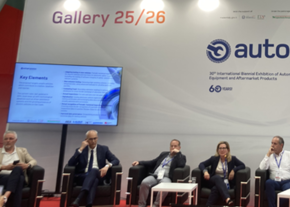
07/11/2017
Connected cars lock down against hackers
Dino Collazzo
Digitization and computer security are the challenges facing the automotive world over the next three years. According to a study by Frost & Sullivan and Irdeto, investments in this field are expected to be in the region of $ 82 billion
Hacker-proof connected cars. As state-of-the-art “intelligent” vehicles - remote diagnostics, telematics, autonomous driving, ADAS systems and infotainment – take to the road, a number of security related issues were brought to the fore, forcing the automotive world into taking necessary countermoves through investment in innovative ideas and the creation of laboratories where cyber security experts test new systems designed to hunt-down bugs and backdoors.
Not a simple task. Probably because the growing number of apps coming from third-party companies - often with low levels of security -, the complexity of systems and the frequency of "over-the-air" software updates makes it difficult to monitor all of them simultaneously. The risk is that communication between different components - both within the vehicle and with the outside environment - and the use of on-board devices (smartphones and tablets) can cause interferences, opening the door to cybercriminals. Ransomware, malware, data theft, and sabotage are just some of the possible threats that a car owner may be exposed to. Despite the fact that a definite solution doesn’t seem to be close at hand, several attempts at safeguarding connected cars are currently being made. This is the case of the Secure communication unit (Scu): a security system unveiled at the New mobility world in Frankfurt by Kaspersky Lab, Avl Software and Functions GmbH. So far it's just a prototype designed to make vehicles connected via IoT (Internet of Things) technology "secure-by-design". Basically, Scu makes communication between the various parts of the car and between the vehicle and external devices and infrastructures possible without interferences. All this is possible because this security system acts as a gateway control unit for connections that can act as a single secure gateway for inbound and outbound communication flows.
The issue of computer security is therefore of primary importance for the automotive industry as well as its business volumes. So much so that automobile companies are not self-sparing when it comes to investments for new technologies to be applied in this area. A recent study by Frost & Sullivan and Irdeto (a company specialized in the field of digital platform security), titled "Cybersecurity for the automotive industry", places the emphasis on this issue. According to researchers, Oem and top-level suppliers have realized that digitalisation and IT security, along with hi-tech partnerships, software enhancement, and customization, represent the industry’s future. Over the next three years, according to researchers, increasing digitization will drive the automotive industry to invest $ 82 billion on advanced technologies.
Not a simple task. Probably because the growing number of apps coming from third-party companies - often with low levels of security -, the complexity of systems and the frequency of "over-the-air" software updates makes it difficult to monitor all of them simultaneously. The risk is that communication between different components - both within the vehicle and with the outside environment - and the use of on-board devices (smartphones and tablets) can cause interferences, opening the door to cybercriminals. Ransomware, malware, data theft, and sabotage are just some of the possible threats that a car owner may be exposed to. Despite the fact that a definite solution doesn’t seem to be close at hand, several attempts at safeguarding connected cars are currently being made. This is the case of the Secure communication unit (Scu): a security system unveiled at the New mobility world in Frankfurt by Kaspersky Lab, Avl Software and Functions GmbH. So far it's just a prototype designed to make vehicles connected via IoT (Internet of Things) technology "secure-by-design". Basically, Scu makes communication between the various parts of the car and between the vehicle and external devices and infrastructures possible without interferences. All this is possible because this security system acts as a gateway control unit for connections that can act as a single secure gateway for inbound and outbound communication flows.
The issue of computer security is therefore of primary importance for the automotive industry as well as its business volumes. So much so that automobile companies are not self-sparing when it comes to investments for new technologies to be applied in this area. A recent study by Frost & Sullivan and Irdeto (a company specialized in the field of digital platform security), titled "Cybersecurity for the automotive industry", places the emphasis on this issue. According to researchers, Oem and top-level suppliers have realized that digitalisation and IT security, along with hi-tech partnerships, software enhancement, and customization, represent the industry’s future. Over the next three years, according to researchers, increasing digitization will drive the automotive industry to invest $ 82 billion on advanced technologies.






